#there are no fantasy races
Text
Quick modern AU Karlach idea…

#bg3#baldur's gate 3#karlach#bg3 fanart#fanart#doodle#headcanon#biker Karlach#modern AU#what if#there are no fantasy races#she’s just an racially ambiguous woman#and her horns are on her bike helmet?#just thinking
58 notes
·
View notes
Text
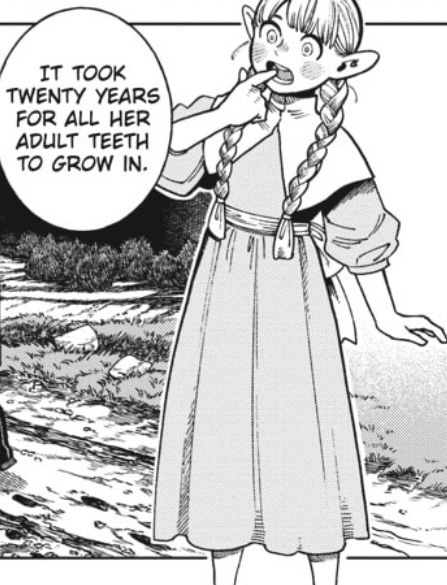
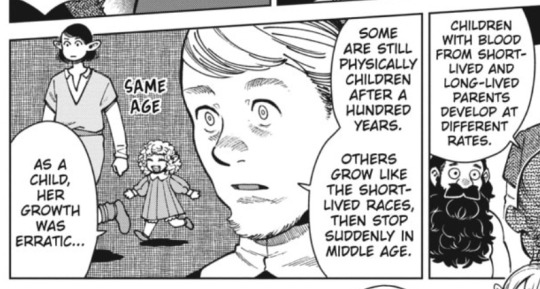
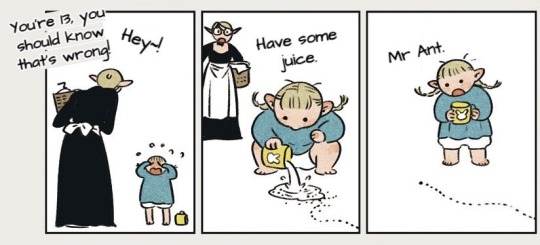
i’ve seen too many people arguing that marcille was already a full grown adult when she went to school at 35 despite literally all of the canon evidence indicating otherwise
#like trying to map fantasy race lifespans to exact equivalent human ages is pointless bc it simply does not work#so forget the numbers and start judging by how the story depicts the characters’ growth and maturity instead#dungeon meshi#delicious in dungeon#marcille donato#dungeon meshi marcille#dunmeshi spoilers#dungeon meshi spoilers#delicious in dungeon spoilers
37K notes
·
View notes
Text

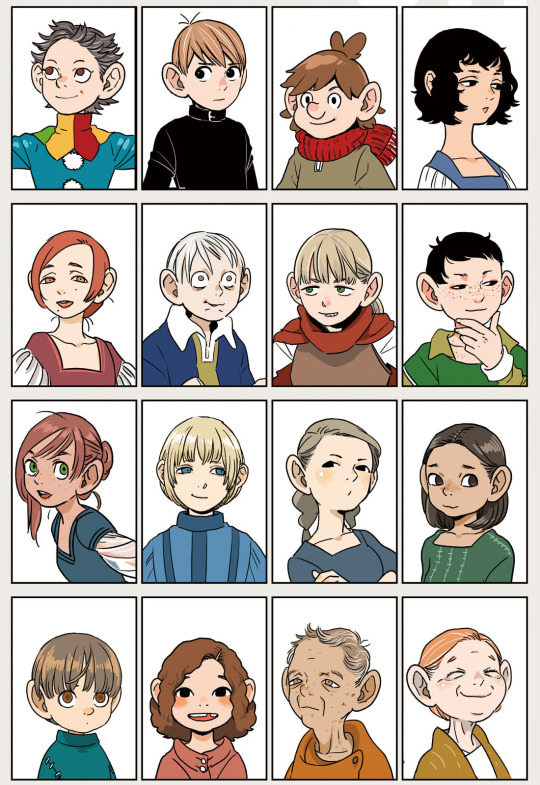
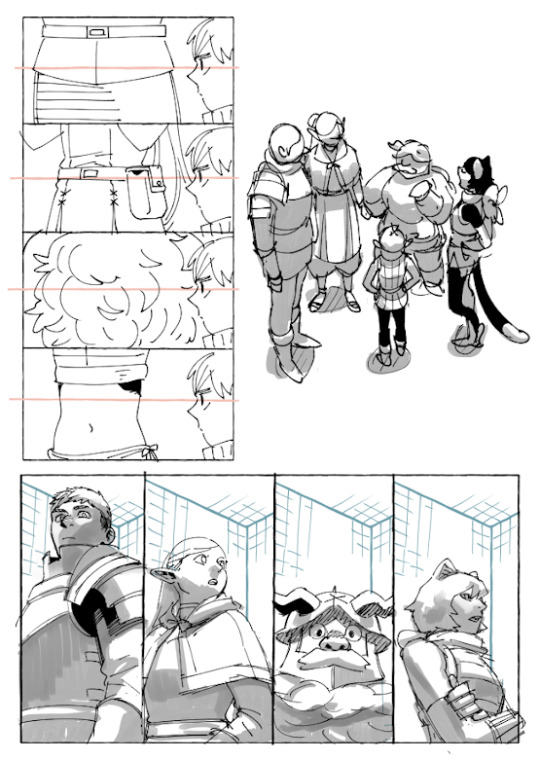
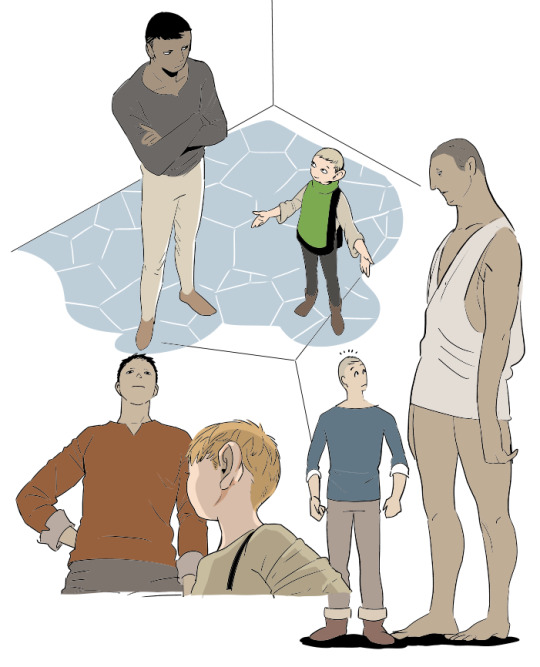
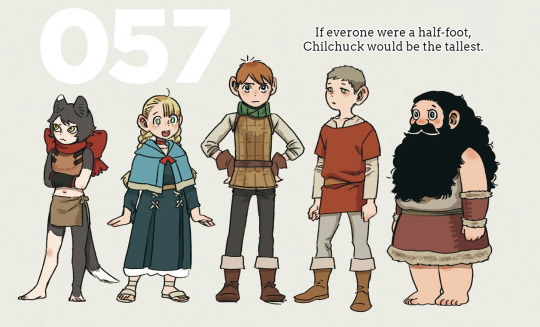
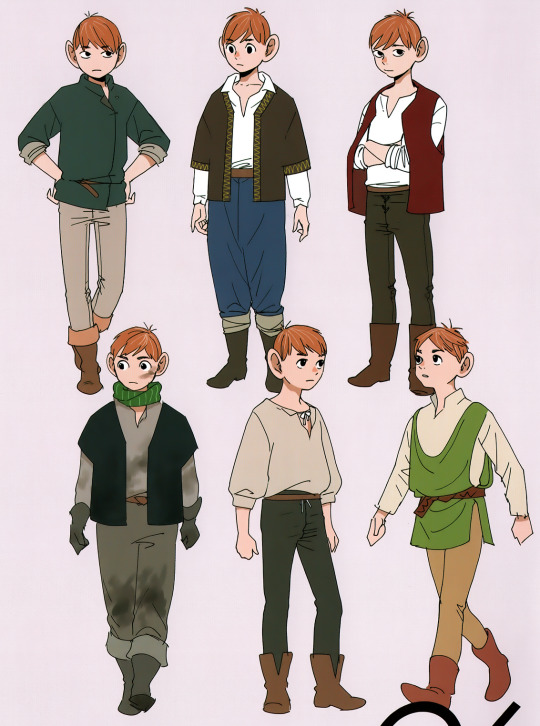
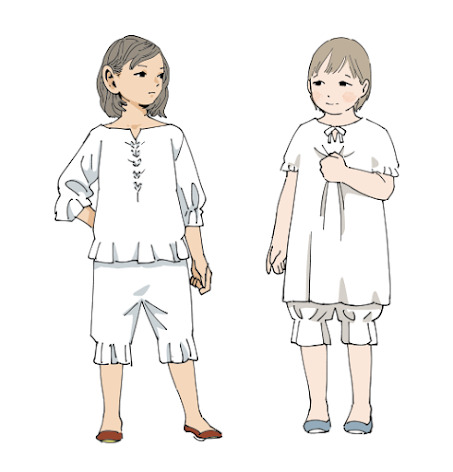

Dungeon Meshi - Half-foots
source 1 | source 2
#Dungeon meshi#Chilchuck#Half-foots#Daydream Hour#Added context of what I believe a few of the images are showing on alt#Dungeon meshi races#Chilchuck Tims#Fantasy Race#Halfling#Ryoko Kui#half-foot#compilation#for referencing
13K notes
·
View notes
Text
#yes humans are a fantasy race what abt it#this is 100% inspired by dungeon meshi. as would be obvious to anyone who knows me. but i put some of the races we dont get on dunmeshi.#like fair folk#entertain me with this please. im bored and looking for attention.#gi talks#polls#fair folk#fantasy creature#goblincore#cottagecore#1#1k#b
9K notes
·
View notes
Text
How Do I Make My Fictional Gypsies Not Racist?
(Or, "You can't, sorry, but…")
You want to include some Gypsies in your fantasy setting. Or, you need someone for your main characters to meet, who is an outsider in the eyes of the locals, but who already lives here. Or you need a culture in conflict with your settled people, or who have just arrived out of nowhere. Or, you just like the idea of campfires in the forest and voices raised in song. And you’re about to step straight into a muckpile of cliches and, accidentally, write something racist.
(In this, I am mostly using Gypsy as an endonym of Romany people, who are a subset of the Romani people, alongside Roma, Sinti, Gitano, Romanisael, Kale, etc, but also in the theory of "Gypsying" as proposed by Lex and Percy H, where Romani people are treated with a particular mix of orientalism, criminalisation, racialisation, and othering, that creates "The Gypsy" out of both nomadic peoples as a whole and people with Romani heritage and racialised physical features, languages, and cultural markers)
Enough of my friends play TTRPGs or write fantasy stories that this question comes up a lot - They mention Dungeons and Dragons’ Curse Of Strahd, World Of Darkness’s Gypsies, World Of Darkness’s Ravnos, World of Darkness’s Silent Striders… And they roll their eyes and say “These are all terrible! But how can I do it, you know, without it being racist?”
And their eyes are big and sad and ever so hopeful that I will tell them the secret of how to take the Roma of the real world and place them in a fictional one, whilst both appealing to gorjer stereotypes of Gypsies and not adding to the weight of stereotyping that already crushes us. So, disappointingly, there is no secret.
Gypsies, like every other real-world culture, exist as we do today because of interactions with cultures and geography around us: The living waggon, probably the archetypal thing which gorjer writers want to include in their portrayals of nomads, is a relatively modern invention - Most likely French, and adopted from French Showmen by Romanies, who brought it to Britain. So already, that’s a tradition that only spans a small amount of the time that Gypsies have existed, and only a small number of the full breadth of Romani ways of living. But the reasons that the waggon is what it is are based on the real world - The wheels are tall and iron-rimmed, because although you expect to travel on cobbled, tarmac, or packed-earth roads and for comparatively short distances, it wasn’t rare to have to ford a river in Britain in the late nineteenth century, on country roads. They were drawn by a single horse, and the shape of that horse was determined by a mixture of local breeds - Welsh cobs, fell ponies, various draft breeds - as well as by the aesthetic tastes of the breeders. The stove inside is on the left, so that as you move down a British road, the chimney sticks up into the part where there will be the least overhanging branches, to reduce the chance of hitting it.
So taking a fictional setting that looks like (for example) thirteenth century China (with dragons), and placing a nineteenth century Romanichal family in it will inevitably result in some racist assumptions being made, as the answer to “Why does this culture do this?” becomes “They just do it because I want them to” rather than having a consistent internal logic.
Some stereotypes will always follow nomads - They appear in different forms in different cultures, but they always arise from the settled people's same fears: That the nomads don't share their values, and are fundamentally strangers. Common ones are that we have a secret language to fool outsiders with, that we steal children and disguise them as our own, that our sexual morals are shocking (This one has flipped in the last half century - From the Gypsy Lore Society's talk of the lascivious Romni seductress who will lie with a strange man for a night after a 'gypsy wedding', to today's frenzied talk of 'grabbing' and sexually-conservative early marriages to ensure virginity), that we are supernatural in some way, and that we are more like animals than humans. These are tropes where if you want to address them, you will have to address them as libels - there is no way to casually write a baby-stealing, magical succubus nomad without it backfiring onto real life Roma. (The kind of person who has the skills to write these tropes well, is not the kind of person who is reading this guide.)
It’s too easy to say a list of prescriptive “Do nots”, which might stop you from making the most common pitfalls, but which can end up with your nomads being slightly flat as you dance around the topics that you’re trying to avoid, rather than being a rich culture that feels real in your world.
So, here are some questions to ask, to create your nomadic people, so that they will have a distinctive culture of their own that may (or may not) look anything like real-world Romani people: These aren't the only questions, but they're good starting points to think about before you make anything concrete, and they will hopefully inspire you to ask MORE questions.
First - Why are they nomadic? Nobody moves just to feel the wind in their hair and see a new horizon every morning, no matter what the inspirational poster says. Are they transhumant herders who pay a small rent to graze their flock on the local lord’s land? Are they following migratory herds across common land, being moved on by the cycle of the seasons and the movement of their animals? Are they seasonal workers who follow man-made cycles of labour: Harvests, fairs, religious festivals? Are they refugees fleeing a recent conflict, who will pass through this area and never return? Are they on a regular pilgrimage? Do they travel within the same area predictably, or is their movement governed by something that is hard to predict? How do they see their own movements - Do they think of themselves as being pushed along by some external force, or as choosing to travel? Will they work for and with outsiders, either as employees or as partners, or do they aim to be fully self-sufficient? What other jobs do they do - Their whole society won’t all be involved in one industry, what do their children, elderly, disabled people do with their time, and is it “work”?
If they are totally isolationist - How do they produce the things which need a complex supply chain or large facilities to make? How do they view artefacts from outsiders which come into their possession - Things which have been made with technology that they can’t produce for themselves? (This doesn’t need to be anything about quality of goods, only about complexity - A violin can be made by one artisan working with hand tools, wood, gut and shellac, but an accordion needs presses to make reeds, metal lathes to make screws, complex organic chemistry to make celluloid lacquer, vulcanised rubber, and a thousand other components)
How do they feel about outsiders? How do they buy and sell to outsiders? If it’s seen as taboo, do they do it anyway? Do they speak the same language as the nearby settled people (With what kind of fluency, or bilingualism, or dialect)? Do they intermarry, and how is that viewed when it happens? What stories does this culture tell about why they are a separate people to the nearby settled people? Are those stories true? Do they have a notional “homeland” and do they intend to go there? If so, is it a real place?
What gorjers think of as classic "Gipsy music" is a product of our real-world situation. Guitar from Spain, accordions from the Soviet Union (Which needed modern machining and factories to produce and make accessible to people who weren't rich- and which were in turn encouraged by Soviet authorities preferring the standardised and modern accordion to the folk traditions of the indigenous peoples within the bloc), brass from Western classical traditions, via Balkan folk music, influences from klezmer and jazz and bhangra and polka and our own music traditions (And we influence them too). What are your people's musical influences? Do they make their own instruments or buy them from settled people? How many musical traditions do they have, and what are they all for (Weddings, funerals, storytelling, campfire songs, entertainment...)? Do they have professional musicians, and if so, how do those musicians earn money? Are instrument makers professionals, or do they use improvised and easy-to-make instruments like willow whistles, spoons, washtubs, etc? (Of course the answer can be "A bit of both")
If you're thinking about jobs - How do they work? Are they employed by settled people (How do they feel about them?) Are they self employed but providing services/goods to the settled people? Are they mostly avoidant of settled people other than to buy things that they can't produce themselves? Are they totally isolationist? Is their work mostly subsistence, or do they create a surplus to sell to outsiders? How do they interact with other workers nearby? Who works, and how- Are there 'family businesses', apprentices, children with part time work? Is it considered 'a job' or just part of their way of life? How do they educate their children, and is that considered 'work'? How old are children when they are considered adult, and what markers confer adulthood? What is considered a rite of passage?
When they travel, how do they do it? Do they share ownership of beasts of burden, or each individually have "their horse"? Do families stick together or try to spread out? How does a child begin to live apart from their family, or start their own family? Are their dwellings something that they take with them, or do they find places to stay or build temporary shelter with disposable material? Who shares a dwelling and why? What do they do for privacy, and what do they think privacy is for?
If you're thinking about food - Do they hunt? Herd? Forage? Buy or trade from settled people? Do they travel between places where they've sown crops or managed wildstock in previous years, so that when they arrive there is food already seeded in the landscape? How do they feel about buying food from settled people, and is that common? If it's frowned upon - How much do people do it anyway? How do they preserve food for winter? How much food do they carry with them, compared to how much they plan to buy or forage at their destinations? How is food shared- Communal stores, personal ownership?
Why are they a "separate people" to the settled people? What is their creation myth? Why do they believe that they are nomadic and the other people are settled, and is it correct? Do they look different? Are there legal restrictions on them settling? Are there legal restrictions on them intermixing? Are there cultural reasons why they are a separate people? Where did those reasons come from? How long have they been travelling? How long do they think they've been travelling? Where did they come from? Do they travel mostly within one area and return to the same sites predictably, or are they going to move on again soon and never come back?
And then within that - What about the members of their society who are "unusual" in some way: How does their society treat disabled people? (are they considered disabled, do they have that distinction and how is it applied?) How does their society treat LGBT+ people? What happens to someone who doesn't get married and has no children? What happens to someone who 'leaves'? What happens to young widows and widowers? What happens if someone just 'can't fit in'? What happens to someone who is adopted or married in? What happens to people who are mixed race, and in a fantasy setting to people who are mixed species? What is taboo to them and what will they find shocking if they leave? What is society's attitude to 'difference' of various kinds?
Basically, if you build your nomads from the ground-up, rather than starting from the idea of "I want Gypsies/Buryats/Berbers/Minceiri but with the numbers filed off and not offensive" you can end up with a rich, unique nomadic culture who make sense in your world and don't end up making a rod for the back of real-world cultures.
7K notes
·
View notes
Text
Recently I've seen my old plus-sized fantasy creatures get some love from you guys, so I made two more lovelies!!
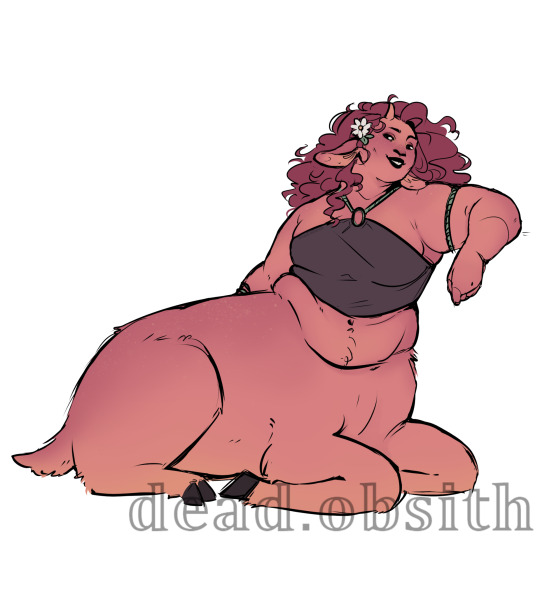

#artists on tumblr#drawing#digital art#character design#original character#oc drawing#oc#fantasy drawing#fantasy art#fantasy race#centaur#orc#centaur oc#orc oc
11K notes
·
View notes
Text
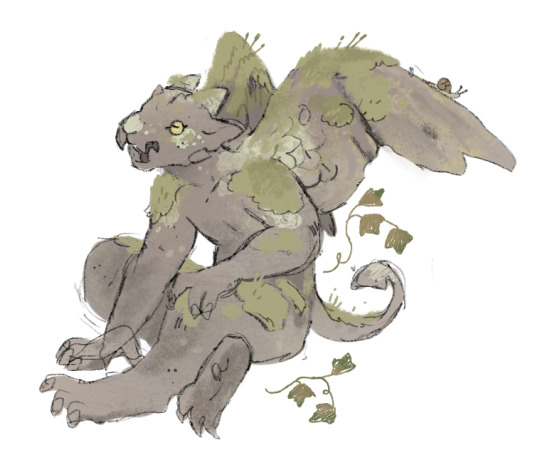
the grassy gnoll had me thinking about a mossy rock … mossy .. statue?
so here is a gargoyle i’ve doodled up. he’s my son
#art#ID in alt text#fantasy art#fantasy character design#umm not gonna tag this dnd because technically it isn’t but#i had the thought to maybe play this fellow and use the warforged race for the function#they’re an animated statue who doesn’t sleep or eat or anything#they were born yesterday so everyone needs to be nice to them
20K notes
·
View notes
Text
I LOVE Dungeon Meshi's Realistic Fantasy Races
Ok, I had to stop for a moment to gush about the fantasy races of Dunmeshi, and all the consideration that's been put into them, because they actually follow a degree of natural/evolutionary logic not found in most fantasy stories!
Half-Foots (halflings/hobbits):
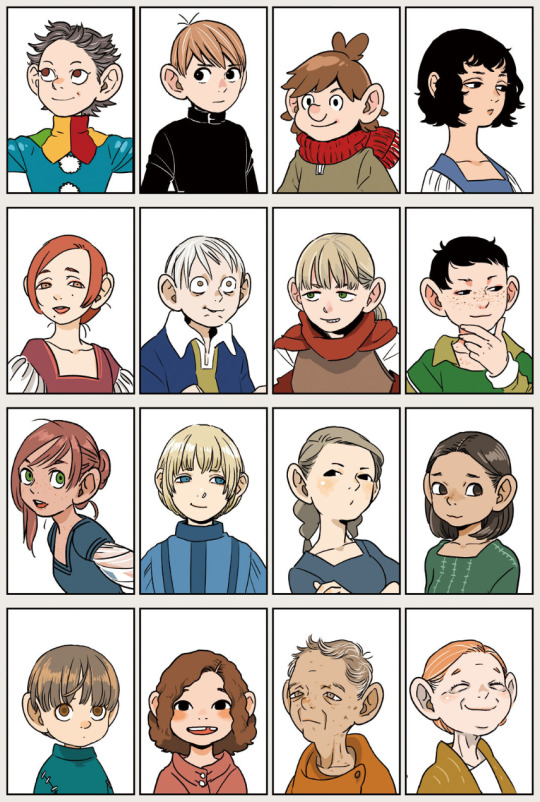
So we all know these fellows have excellent hearing and smell, but have you considered WHY? It's an adaptation to counteract their size. Humans (called tallmen in this setting) rely so much on eyesight because we're really tall compared to most animals, giving us a fantastic vantage of our environment. Half-Foots don't have this advantage, and therefore rely on their other senses. It's also much more important for them to be able to detect unseen threats and move quickly, because their size makes them ill-equipped for direct conflict.
Dwarves:
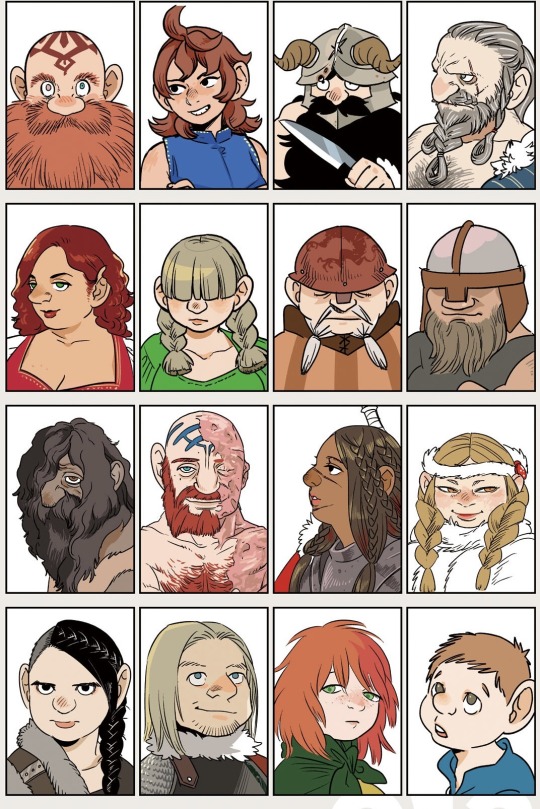
So Dwarves are depicted as MUCH stronger than tallmen despite their size, right? This is because strength is determined not by size, but by mass, and dwarven bodies are very dense! Yet this comes with the downside of their bodies burning more energy and overheating much faster, which is why dwarves are also shown to be heat-resistant, and why they tend to wear lighter clothing that exposes more skin! Their night-vision is also better than humans' due to their semi-underground lifestyle, while their hearing remains about the same since sound naturally carries in caves. Their hairiness is also likely a direct adaptation to counteract magic, as it's been shown to form a natural buffer when left unwashed.
Gnomes:
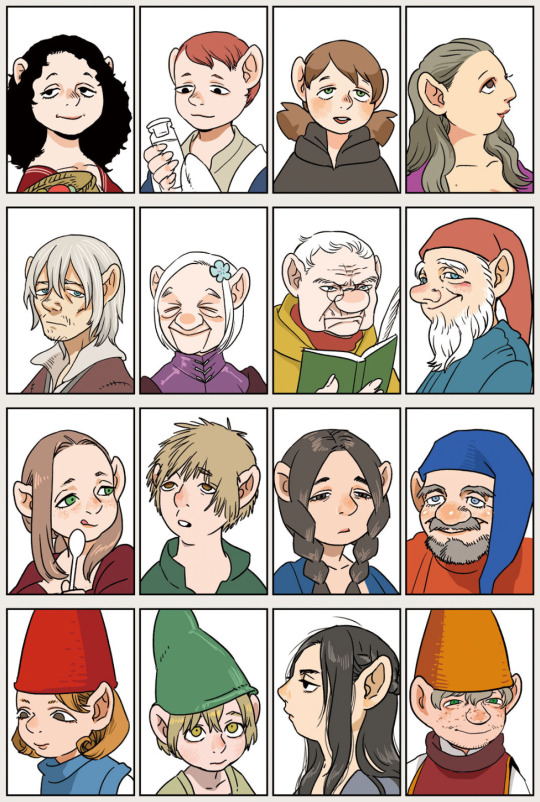
Gnomes are supposed to be evolutionary cousins to dwarves, and it shows! They share a similar height, but are less muscular and have peculiarly-shaped ears, almost mirroring the difference between human and elven ears. Their affinity with nature and spirits also makes sense, because physically they're in an awkward spot compared to the other short races, lacking both the hefty strength of dwarves and the light nimbleness of half-foots. Being less equipped both for fight and flight, it makes sense they'd instead adapt the instinctive ability to read their environments and mitigate its threats through cohabitation.
Elves:

Like gnomes, elves are in a physically awkward place, however it's even more extreme. Their relatively light and weak bodies make them ill-equipped for direct conflict, and while likely able to move faster than tallmen due to weight, they lack the half-foot's danger-detection senses. This makes them seemingly helpless, however interestingly it actually explains why they're so advanced compared to other races! They were basically forced to coordinate problem-solve, and control their environments out of necessity, which is reflected in their more controlling and direct relationship with magic and nature compared to gnomes.
This actually mirrors the real-world difference between humans and neanderthals. Anthropologists believe neanderthals weren't actually dumber than humans, but that their superior strength and durability meant they weren't forced to problem-solve or control their environments like humans, meaning they seemed less advanced.
3K notes
·
View notes
Text
”average adventuring party kills two clerics a year” factoid actualy just statistical error. Average adventuring party kills 0 clerics per year. Spiders Ratgrinders, who hangout in the far haven woods & kills a whopping two clerics a year, is an outlier adn should not have been counted.
#d20 fhjy#fantasy high junior year spoilers#fhjy#fhjy spoilers#fantasy high#buddy dawn#the ratgrinders#d20#what the fuck#the bad kids#kipperlilly copperkettle#ruben hopclap#oisin hakinvar#mary ann skuttle#ivy embra#lucy frostblade#appreciate my commitment to the spelling errors#RACED to make this joke#kristen applebees#figeroth faeth#fabian aramais seacaster#riz gukgak#adaine abernant#gorgug thistlespring
1K notes
·
View notes
Text
asdfghjkl
#ffvii#ff7#final fantasy#rupaul's drag race#rpdr#cloud#sephiroth#x#tiktok#raja gemini#final fantasy vii#final fantasy 7
3K notes
·
View notes
Text
okay not to over analyze a lighthearted piece of dialogue from freshman year but when gorgug dies and wilma&digby are upset because they don't know how to connect with him in that feeling, it makes me think abt transracial adoptee gorgug and the experience of white parents who fundamentally do not understand their child of colour and cannot bridge the gap to sympathizing with things they do not relate to. i know wilma&digby love him and i think they're good parents, but the stance in fandom that they're perfect parents is very strange to me tbh. their house is too little for their son to exist.
#fantasy high#fhfy#gorgug thistlespring#i do love them but its a nuanced kind of love ok. gorgug agrees.#i think the fandom is very good at noticing queer implications and allegories and really bad at race ones
879 notes
·
View notes
Text
fuck tolkein and fuck dnd for being the originator and modern popularizer respectively of the race science tropes that have glued themselves parasitically to the fantasy genre and refuse to come off
#yea yea yea ik there has always been a very reactionary bent to the fantasy genre#but tolkein absolutely codified What If Race Science Was Real as a foundational pillar of the fantasy genre#and dnd has been its torchbearer for the last like 50 years#best of
19K notes
·
View notes
Text

Three AUdiirns I’ve had pinballing around in my brain
Guardian - stuck in time loop hell to save those he once adventured beside. I wrote about it almost a year ago, here.
Ascended - Astarion ascended, Aldiirn built his empire then took it all for himself.
Modern - union courier committing insurance fraud to help Astarion who can’t afford treatment with his high profile but exploitative modelling gig. Goes smooth until a photo of them together goes all over social media, then they gotta fake date to keep up the ruse. Inspired by @satanicspinosaurus!
Anyway i love how two of these are like high fantasy sorta-villainous AUs and then there’s fedex aldiirn with your parcel
#bg3#sketch#c:aldiirn#bg3 fanart#crowbart#someone asked if guardian got toned or ascended has been indulging more#the answer is yes lmao#Modern is i guess they have fantasy races but idk about magic#didnt think that far#imagine if magical healing coverage was an entirely different thing#anyway the drow are australian#ascended au#bg3 modern au#guardian au
418 notes
·
View notes
Text
Something that completely flew over my head (I am not very observant), I was rereading chapter 87: Winged Lion II to re-check some things about dungeons and I just now realized the ancient humans weren't from the current races we know.
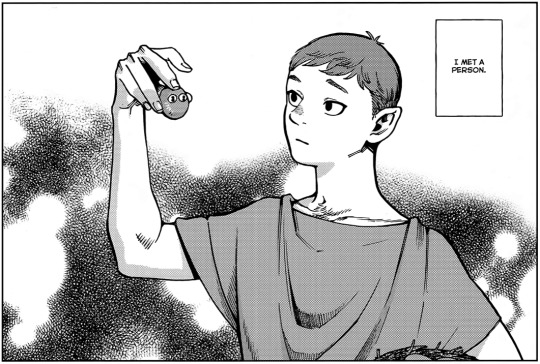
They seem to have characteristics from several of the human races together, and some of them even seem to have fur (like demi-humans?)
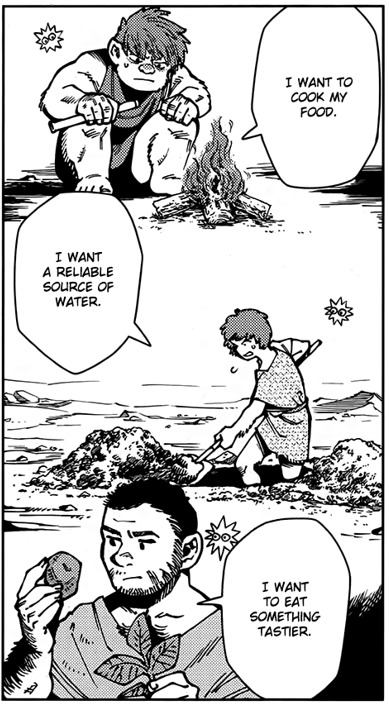
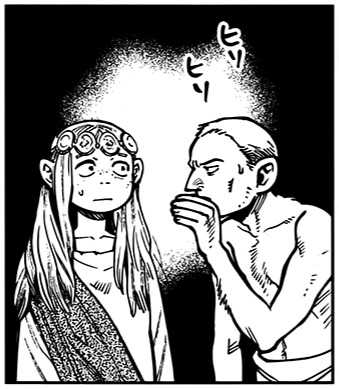
It's even implied that the lifespan differences and physical differences (the two asking for muscles and using magic in the background) were due to the Demon granting wishes
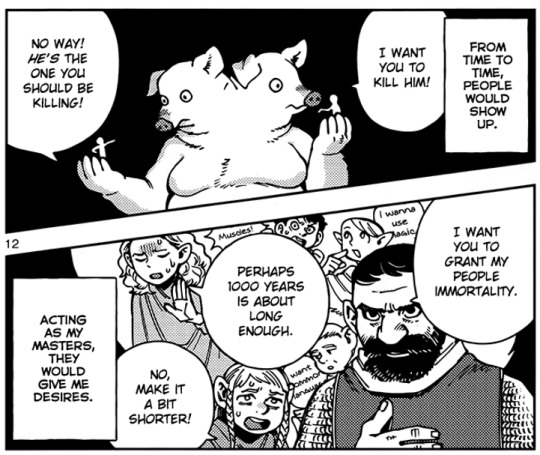
I did notice this part but I didn't realize this was probably part of the source of the race differences rather than the races already being different and wishing for different things.
So at some point the human races might have been even more closely related, before a powerful being influenced their evolution.

#dungeon meshi#dungeon meshi spoilers#dunmeshi thoughts#major spoilers#Dungeon Meshi races#worldbuilding#Winged Lion#Demon#fantasy worldbuilding#I probably only noticed this now cause I became more used to the races while writting this blog#so the shorter pointy ear the fur and the tall gnome looking humans called my attention#I unfortunately dont pay much attention to how characters look usually
6K notes
·
View notes
Text
Fantasy races are an uncomfortable concept, because they present a world that literally works the way racists think that it works. The attempts to mitigate this problem often fail to address the core concern, merely making the idea more palatable.
A big example is trying to correct by changing the language from "races" to "species." This attempt fails for two reasons:
1) Exactly! Racists think that people of other races are a different species. That's the foundation of "race science," phrenology, all of it.
2) Are demihumans different species, though? Like, the interactions between elves and dwarves don't resemble the interactions between different species in our world. They don't act like snakes and lemurs, or whales and krill, or even cats and dogs. More often we've got different groups of people, who may speak different languages and have different cultural practices, engaging in diplomacy or war and struggling to coexist. In practice, they are treated as nations: ethnicities. Except they're ethnicities who are biologically distinct enough to have objective differences in ability.
This is something that puts me on edge in Mass Effect, otherwise one of my favorite games. True, the game ultimately lands on condemning the genophage, and it's not subtle about that. I mean just look at the name... But it's still considered debatable, morally grey, and Mordin Solus remains one of the most charming and enduring heroes of the series. The setting has bent over backwards to make every racist stereotype and talking point as legitimate as possible. In this setting, it is objectively true, scientifically proven that it is in the DNA of Krogans to naturally be violent, warmongering killing machines whose explosively rapid breeding poses an existential threat to the galaxy. That in turn is meant to make us think that maybe forced sterilization is something worth considering. It's hard to ignore the parallels to real life racist propaganda. I don't think it's malicious, just ungrounded and thoughtless; the result of creators to whom these ideals are abstract thought experiments, rather than reflections of real history.
Another big example is Dark Elves. They try to make it okay, to mitigate the message by fleshing them out as characters, by scapegoating an abusive deity rather than an ingrained nature, by erasing the monster manual description that reads "Always Chaotic Evil," by trending skin tone away from black and towards purple, or gray, even pale white. But none of it really changes the core issue, does it? The idea of drow is to equate dark skin with evil, to fetishize that idea, and to tell a story about a subsect of people cast into darkness as a result of sin in a direct parallel to racist Christian beliefs about dark skin being a curse or punishment from God.
So, do I think we need to cancel Mass Effect and stop playing D&D or telling stories about drow? No, not really. I mean... I do all these things. Truth is, I don't have an actionable solution, for myself or anyone. But the dynamic is clearly present and worth describing. And the attempts to challenge it are often insufficient, more about making ourselves feel better about what we're already doing than enacting real change.
1K notes
·
View notes
Text
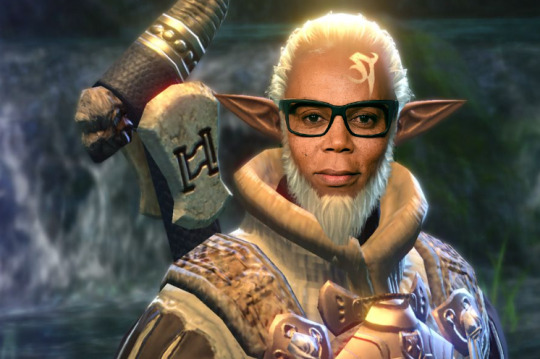
Ruisoix Leveilleur
467 notes
·
View notes